On May 15, Dak Lak Provincial Police issued warnings about fraudulent tricks and acts of appropriating property and collecting personal information of local people during the preparation period for the 2025 high school graduation exam.
According to Dak Lak Provincial Police, usually in May and June every year, taking advantage of students' anxiety and stress and parents' expectations, online fraud related to exams shows signs of increasing, with increasingly sophisticated methods.
Selling exam papers "from outside sources", "VIP exam cheat sheets"...
Through monitoring the situation on cyberspace, Dak Lak Provincial Police said some common scams that criminals often use during exam season.
Specifically, they advertise "real exam questions" and "100% accurate answers". On forums and social networking groups, many fake accounts post advertisements with information about "leaked 2025 high school exam questions", "accurate answers for each question", "VIP cheat sheets guarantee high scores"; with prices ranging from several hundred thousand to tens of millions of dong.
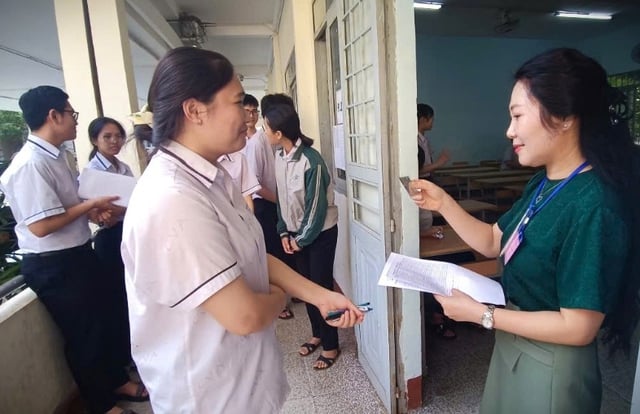
Candidates take the 2025 high school graduation mock exam at a high school in Dak Lak
PHOTO: DAK LAK DEPARTMENT OF EDUCATION AND TRAINING
Many students, due to pressure on their grades or subjective psychology, have spent money to buy these "exam papers". After receiving the transfer from the buyer, the scammers often block contact, disappear or send back worthless documents, even exam papers from previous years.
Another trick is to open "ghost" online exam preparation courses with attractive advertisements such as "100% pass guarantee", "guarantee the minimum score of TOP schools", "top exam preparation experts" to attract students to register for online courses.
After students pay tuition, scammers may only send a few sketchy documents, copied from multiple sources, or even not provide any documents, classes and cut off all communication.
Also according to Dak Lak Provincial Police, a particularly dangerous trick is the fraud of "raising scores" and "buying places" to enter university. The crooks claim to have "relationships" and "relatives" in the education sector, and are able to intervene, "increase test scores" or "buy" a place in the desired university at a huge cost, which can be up to hundreds of millions of dong...
There is also a form of fraud in which the scammers impersonate education officials and school staff to "support" the application and review process. Fraudsters call, send SMS, Zalo, and email messages, claiming to be officials from the Department of Education and Training or admissions staff of universities and colleges, informing them of "urgent" errors in the application, threatening that the application may be rejected, and requesting immediate provision of the ID card number, bank OTP code, or transfer of an amount of money called "urgent processing fee" or "application completion fee".
Fraudsters even send fake links to the website interfaces of the Ministry of Education and Training and schools, asking for logins with the aim of collecting personal information.
Equip the necessary "shield"
Dak Lak Provincial Police advises candidates in the high school graduation exam that success in the exam only comes from effort, serious review and practical knowledge. There are no "real exam questions" sold publicly, no "magic answers" or "miracle courses" that guarantee perfect scores.
At the same time, it is recommended that parents and students equip themselves with the necessary "shields" against the increasingly sophisticated tricks of cybercriminals.
Accordingly, it is necessary to carefully verify all information when receiving any suspicious information. It is necessary to keep personal information absolutely confidential, do not provide CCCD number, date of birth, phone number, home address, bank account information, OTP code to anyone via phone, text message, email if their identity and purpose have not been verified. Be extremely careful when clicking on strange links, do not download attachments of unknown origin.
Be wary of unusual financial transactions, do not transfer money to strangers or unclear requests.
Report immediately to the police if you discover or suspect signs of fraud. If you are unfortunate enough to become a victim, collect all evidence (text messages, phone numbers, bank account information of the subject, transaction history...) and immediately report to the nearest police station for timely support.
Source: https://thanhnien.vn/bay-lua-dao-tinh-vi-qua-mang-trong-mua-thi-tot-nghiep-thpt-185250515154029722.htm






![[Photo] National Assembly Chairman Tran Thanh Man meets with Thai Prime Minister Paetongtarn Shinawatra](https://vphoto.vietnam.vn/thumb/1200x675/vietnam/resource/IMAGE/2025/5/15/e71160b1572a457395f2816d84a18b45)
![[Photo] Prime Ministers of Vietnam and Thailand visit the Exhibition of traditional handicraft products](https://vphoto.vietnam.vn/thumb/1200x675/vietnam/resource/IMAGE/2025/5/15/6cfcd1c23b3e4a238b7fcf93c91a65dd)
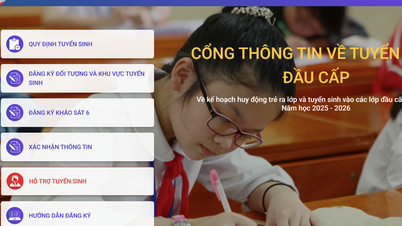






























































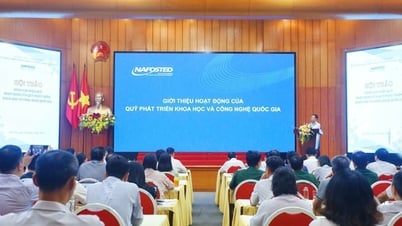










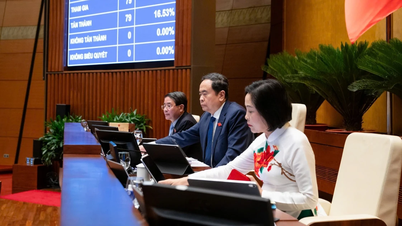

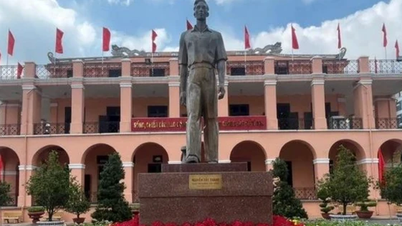








Comment (0)